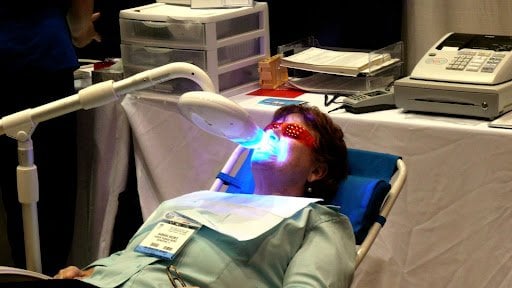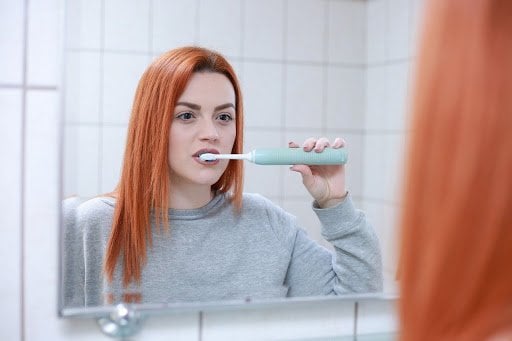Teeth whitening is in very high demand ever since its products and procedures have shown the world its whiter smile capabilities. Most people have tried various over-the-counter whitening remedies and now want to explore professional whitening procedures done by their dentist. Today, we’ll investigate how much teeth whitening costs and a few common questions that come along with the teeth whitening process.
The cost of teeth whitening can differ depending on the type of teeth whitening procedure you’re looking to get done. On one hand, there are various teeth whitening methods that can be performed professionally by your dentist. On the other hand, there are countless brands that make teeth whitening products you can purchase over-the-counter, such as teeth whitening toothpaste, strips, gels, and lights.

When deciding which teeth whitening route to take, you need to consider the cost you’re willing to spend and the results you’re expecting to see with your smile. Over-the-counter purchases will be much cheaper than any professional teeth whitening method, however, there are pros and cons to both.
Professional teeth whitening practices tend to give people brighter smiles and longer-lasting results, but they may require a couple of appointments to complete. OTC products typically need to be applied multiple times to truly see the results people are looking for.
As mentioned above, there are few professional options available to you and many over-the-counter products to explore. Let’s layout the most popular teeth whitening methods to choose from.
Professional Teeth Whitening Options:
- Hydrogen Peroxide Gel
- This procedure uses a syringe to apply the highly concentrated hydrogen peroxide gel
- Hydrogen Peroxide + Laser/Light Method
- This procedure uses the same highly concentrated hydrogen peroxide, but then combines it with a high-intensity UV, halogen, or LED light. For this, dentists use a laser/light device and place it right outside of your mouth.
- Take-Home Trays
- This is where your dentist will make a mold of your teeth for a personalized tray that fits perfectly to you and then have you take that home to wear and apply with peroxide gel.

Over-The-Counter Teeth Whitening Remedies:
- Teeth Whitening Toothpaste
- Teeth Whitening Mouthwash
- Teeth Whitening Strips
- Teeth Whitening Light Kits
- Teeth Whitening Pens
With at-home teeth whitening products, you need to make sure they contain safe levels of peroxide. Whitening products typically include one of these types of peroxide: hydrogen or carbamide. A good rule of thumb to go by is looking for products that have five to ten percent hydrogen peroxide or about thirty-five percent carbamide peroxide.
If you’re looking for the best take-home teeth whitening products, check out our top 5 that we recommend here!
So, how much does teeth whitening cost?
Teeth whitening prices can vary from dentist to dentist and from drug store to drug store. It will also change based on the method you’re choosing to whiten your teeth. For professionally done laser treatments, you’re looking at an average of $1000 per treatment. These are typically defined as the most expensive but the most effective way to get your smile shades whiter.
In-office teeth whitening visits are not always that expensive. You can get treatment for about $600 and still see the results you want since dentists use higher concentrated hydrogen peroxide. The customized take-home trays can range anywhere from $250 to $500, however, annual upkeep may tag some additional costs.
For over-the-counter whitening items, you’re looking at anywhere from $5 to $50. As most know, whitening toothpaste and mouthwashes are much less expensive than some of the pens, lights, and gels on the market.
Is Teeth Whitening Safe?
We already addressed the fact that teeth whitening has become very popular, and rightfully so based on the pearly white results people see in their smiles. But is teeth whitening truly safe for your teeth?
There have been studies conducted that show peroxides could possibly be damaging the proteins that lie in a tooth’s dentin layer. However, dentists noted that these results were concluded from lab testing, not testing performed on living teeth.
The point they’re making is that this damage may not be permanent, it may be reversed after that person stops using teeth whitening products. In essence, there is so definite answer on whether or not there are long-term effects on people’s tooth health if they opt into teeth whitening procedures or products.
The ADA (American Dental Association) made a statement saying that hydrogen peroxide (the peroxide used in almost every teeth whitening method) is a safe and effective teeth whitener. However, there’s always a safe way to go about using hydrogen peroxide teeth whitening products. Follow these simple tips in order to keep your teeth safe:
- Always locate an ADA seal of approval on the teeth whitening product you’re purchasing.
- Closely read the instructions on every teeth whitening product label. Some products are meant to be used once a day and some only once a week.
- Ask your dentist for product referrals if you don’t want a professional treatment. They’ll be able to point you in the right direction!
- Pay attention to teeth sensitivity. This is a very common side effect of any teeth whitening procedure or product, so make sure to make a note of the methods that work or don’t work for you.
If you’re worried about your teeth’ health, there are plenty of ways to help avoid staining them in the first place!
There are plenty of foods and drinks that play a major role in tooth discoloration, but they may not be the most influential factor on your yellowing teeth. Some of the biggest impacts on your teeth’s color include:
- Drinks (coffee, dark sodas, wine, tea)
- Food (various fruits and vegetables such as dark berries, tomatoes, balsamic vinegar, curry, apples, potatoes, etc.)
- Poor hygiene
- Tobacco
- Aging
- Diseases
- Medications
Suffering from tooth discoloration does not have to be your fate. There are plenty of prevention methods you can try out if you experience frequent yellowing or are unable to maintain that whiter color.
Some ways to help with staining include:
- Brushing your teeth after every meal
- This may seem a bit extensive, but it can be highly effective if you’re brushing your teeth properly. Make sure to move in circular motions against your teeth, most people tend to brush from side to side.
- Rinsing your teeth after eating
- This is something to get in the habit of if you’re unable to do a full brush.
- Using an electric toothbrush
- These kinds of brushes can be easier for some people and can reach in crevices you might have missed using a manual brush. An electric toothbrush isn’t absolutely crucial if you have a strong brushing technique.
- Finding a mouthwash with antibacterial components
- This can help reduce plaque on your teeth that is prone to catching stains.
- Purchasing whitening toothpaste
- Just be sure to find a safe version of this.

Now that we’ve gone over teeth whitening prices and best practices, let’s dive into a couple of the most commonly asked questions like, “Am I able to brush my teeth after using whitening strips?” and “How long will my teeth whitening treatments last?”
Do You Brush Your Teeth After Teeth Whitening Strips?
Many people get confused about whether or not they are supposed to brush their teeth after the use of whitening strips. Some get concerned that this will reverse the effects of the whitening or may cause pain in their teeth. These are all fair factors to consider, so let’s settle this confusion once and for all.
Yes, you are able to brush your teeth after using teeth whitening strips. Whitening strips can often cause some teeth sensitivity and gum irritation, so when you go to brush, be even more gentle than usual. It’s suggested that you use a soft-bristled brush after this kind of application to avoid any kind of irritation, but brushing will not affect the strip’s whitening capabilities.
Crest is an extremely well-known dental products company, and they agree with this assessment. They also highly recommend that you do not brush your teeth BEFORE applying their whitening strips. If you’re looking to use them in the morning and you’ve already brushed, let some time pass by before you use the strips.
How Long Does Teeth Whitening Last?
This is also a very frequently asked question by those who use teeth whitening products or just had a teeth whitening treatment.
The answer to this varies because of the wide range of whitening treatments and products available. Other factors such as food, drinks, and dental hygiene also play a role in how fast your teeth can stain after whitening.
Generally, teeth whitening procedures can last you up to two to three years, but some can only last up to six months. If you’re using over-the-counter products, results can last an even shorter amount of time.
Sources:
https://www.forbes.com/health/body/professional-teeth-whitening-guide/
https://www.articleinsider.com/teeth-whitening
https://www.dentalcare.com/en-us/professional-education/ce-courses/ce491/ada-seal-of-acceptance
https://www.hospitalitydental.com/blog/top-foods-that-actually-stain-teeth
https://crest.com/en-us/oral-care-tips/teeth-whitening/brush-teeth-before-after-using-whitestrips
